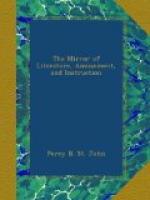I. to Edward IV., exist there, without calendar or
index; and in such masses as to defy the patience
of any inquirer, however ardent. It need not be
said that in such a variety of documents their value
must vary considerably, or that many of them are of
little use; but each of them is at least worthy of
being examined; and there are few of them which, if
properly scrutinized by apt labourers, would not at
least contribute to the elucidation or ratification
of some branch of history. Some of them would
render still more important services; and, by pointing
out the daily habits and most familiar occurrences
of the lives of our kings and other eminent personages
who figure in our history, lead us to a much more
accurate estimate of their genius than any that has
hitherto been formed. With this view, the close
rolls are amongst the most minute and interesting
of those documents which remain unexplored. The
character of King John has had but scanty justice done
to it; and perhaps those who have formed their notions
of that monarch from the ordinary accounts of him,
will be surprised to find him writing to the Abbot
of Reading to acknowledge the receipt of “six
volumes of books, containing the whole of the Old
Testament, Master Hugh de St. Victor’s treatise
on the Sacraments, the Sentences of Peter Lombard,
the Epistles of St. Augustine on the City of God,
and on the 3rd part of the Psalter, Valerian de Moribus,
Origen’s treatise on the Old Testament, and
Candidus Arianus to Marius;”—and that
on another occasion shortly afterwards he acknowledges
the receipt of “his copy of Pliny,” which
had been in the custody of the same Abbot. Still
less does it consist with the commonly adopted notions
of his selfish tyranny, that he should address Bryan
de Insula in terms like the following: “Know
that we are quite willing that our chief barons, concerning
whom you wrote to us, may hunt while passing through
your bailiwick, provided that you know who they are
and what they take; for we do not keep our forests,
nor our beasts, for our own use only, but for the
use also of our faithful subjects. See, however,
that they are well guarded on account of robbers,
for the beasts are more frightened by robbers than
by the aforesaid barons.” Of the reign of
Henry III. the particulars are still more minute.
Notwithstanding its connexion with superstitions which
exist no longer, we may sympathize with the pious
charity that suggested that monarch’s order “for
feeding as many poor persons as can enter the greater
and lesser hall at Westminster on Friday next after
the octaves of St. Matthew, being the anniversary
of Eleanor, the King’s sister, formerly Queen
of Scotland, for the good of the said Eleanor’s
soul.” His taste for the fine arts, and
his encouragement of its professors, are frequently
to be traced in the entries upon these rolls.
In one of them he gives directions for having the
great chamber at Westminster painted with a good green
colour after the fashion of a curtain; and in the great




